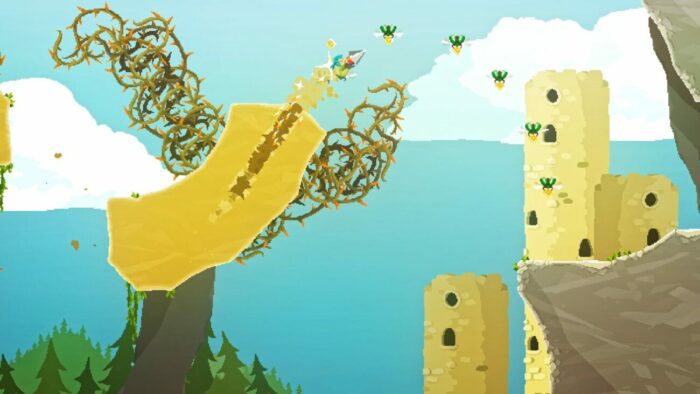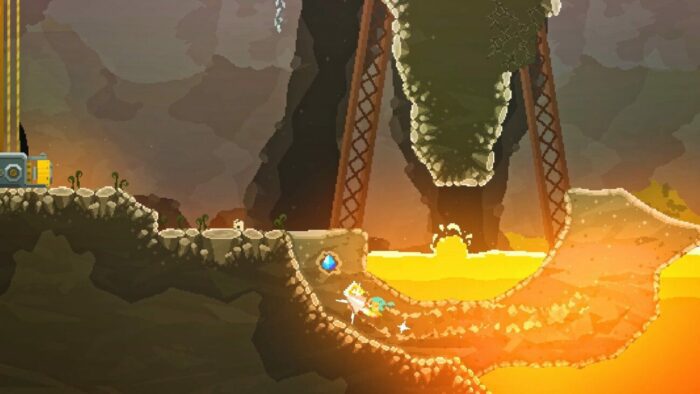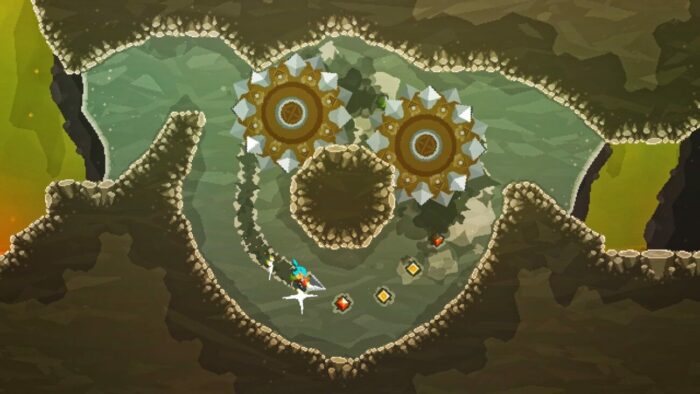As the games market continues to expand, it’s becoming increasingly difficult to identify the games that appeal to me. Browsing through the myriad new releases on online storefronts feels more and more like browsing the BBQ sauce section of a large grocery store: an endless supply of nearly identical products with different labels. Games media doesn’t make things easier as they consolidate and lay off the best writers at once-reliable outlets. As someone who tends to prefer indie games to AAA more often than not, it’s rare for an indie game to break through the noise and stand out among its peers, so when one does it’s usually because of one of two reasons: it’s narratively fascinating or it’s mechanically brilliant. And it helps to have a great gimmick—a high-concept hook that’s easy to understand from the outside. Pepper Grinder does just that.
Pepper Grinder is developed by Ahr Ech, an indie developer who has released a few games prior on itch.io, and this is their first release on major platforms (Steam and Nintendo Switch). It’s published by Devolver Digital. For lack of a better term, it’s a 2D platformer, though that may be a little reductive. There are few platforms, and jumping is far from the primary verb that the player has access to. Still, it has more in common with other games in the platforming genre than anything else. It’s a simple game, done brilliantly.

Pepper Grinder exemplifies the design school of thought that centers on a single simple mechanic, perfecting it, and taking about as far as it can go. It reminds me of other near-perfect games designed around a single core concept like Portal, Journey, and Super-Hot—games that never outstay their welcome after taking their respective unique mechanics to the highest heights that they seemingly can go. To go further would be to add bloat. The result is a lean, focused game that players will return to time and time again.
As with the aforementioned games, the mechanic is deceptively simple. You have what is essentially a large, powerful drill (the titular pepper grinder), that you use to swiftly tunnel through various surfaces. There is a boost button, which temporarily increases your speed and launches you if you exit the surface while boosting. That’s it; for the majority of its 3-4 hour runtime, those are the mechanics. Occasionally you are given various drill-powered tools that add some variety, such as a missile launcher, machine gun, or even a wonderfully large mech, but the heart of the game involves gliding in and out of different surfaces, swirling and weaving through obstacles as you find yourself locked into a flow state. This is one of those games, like Celeste or Super Meat Boy, where as soon as you become aware of what you’re doing, as soon as you think consciously about the multiple micro-decisions that you are constantly making, you will likely fail.
And you will fail a lot. While this isn’t nearly as tough as those famous indie platformers, it is challenging. It can’t exactly require the same level of precision that a traditional platformer can; the multidirectional movement requires a little more leeway than a game revolving around precise jumping does, even if it does occasionally come close. Nevertheless, the difficulty is rarely so punishing that it becomes frustrating, and regular checkpoints are always nearby to help alleviate the pain of failure the few times that it does. Though I wouldn’t have minded a few more (optional) challenge levels for the sickos.

Wanting a little more is rarely a bad thing, especially considering the increasing trend of packing more and more content into games that don’t need it, bloating playtimes to increase hour count. This game is in and out, hitting all of its high points quickly and satisfyingly, like a pro. And if the 3-4 hour playtime seems concerning, know that each level contains hidden collectibles and a speed running challenge—the former forces you to slow down and inspect every possible hidden nook and cranny, while the latter forces you to find the quickest path through each level. These can increase your playtime by several hours.
While it is generally not overly tough, there are a few difficulty spikes that seem to come from nowhere, mostly during the boss battles. It could be fairly argued that the levels don’t adequately prepare the player for the challenges offered by the game’s four bosses because the design of the bosses asks fairly different things from the player than the levels do. This makes them novel, and they certainly add variety, but it would be nice to have been better prepared by the preceding levels. Still, for players who want a little challenge in their platformers, even the toughest moments in Pepper Grinder are very doable with some patience.
The presentation is polished, with crisp animations and a cute, colorful art style. Nobody will be taking screenshots of this game to show off to their friends, but it looks nice enough, with a vibe reminiscent of old-school Sega games. It’s got an upbeat, blue-sky feel. The story is virtually nonexistent, but the music is punchy, crunchy, and highlights the action nicely. The developers included some much-appreciated accessibility features, including the ability to slow down the game speed. I recommend lowering the screen shake because it often obscures the action, making it easy to lose sight of the characters—an unforgivable side-effect in a game like this, where sometimes to blink is to die.

For the vast majority of the game, it’s a joy to play. The most important element in a game like this is how the movement feels—after all, you spend pretty much all of your time simply moving around the world, flowing in and out of dirt, water, ice, magma, mud, and goo, gliding around obstacles, and that needs to feel good. In Pepper Grinder, it all feels spectacular.
Games like this, done this well, are rare. At their best, they feel like meditation—empty your mind and let yourself connect with the game as the mechanics become increasingly reflexive. It’s a joyous celebration of movement and design that any fan of platformers should check out.
